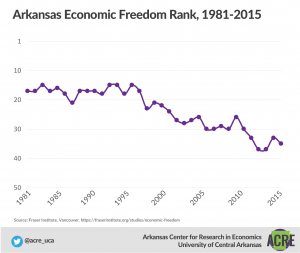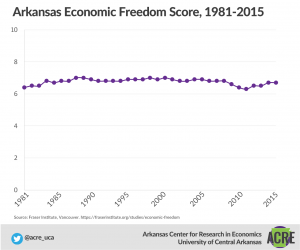This section, along with the other 11 chapters on the most important parts of the Arkansas economy, are authored by Jeremy Horpedahl, an ACRE scholar and assistant professor of economics at the University of Central Arkansas; Amy Fontinelle, author and editor of hundreds of public policy works; and Greg Kaza, Executive Director of the Arkansas Policy Foundation.
This section is a chapter in a larger work – The Citizen’s Guide to Understanding Arkansas Economic Data.
What is economic freedom?
Economic freedom describes people’s ability to act within the market—whether they’re selling their computer programming services, selling someone else’s clothing line, or buying a new car or a haircut— free of undue restrictions.1
Clear and consistent property rights and laws, as well as consumers’ freedom of choice and businesses’ and entrepreneurs’ freedom to compete, form the foundations of economic freedom.
According to the definition in a well-known report on global economic freedom, “The cornerstones of economic freedom are personal choice, voluntary exchange, open markets, and clearly defined and enforced property rights. Individuals are economically free when they are permitted to choose for themselves and engage in voluntary transactions as long as they do not harm the person or property of others.”2
And the authors of a recent study on economic freedom in North America explain that “the freest economies operate with minimal government interference, relying upon personal choice and markets to answer basic economic questions such as what is to be produced, how it is to be produced, how much is produced, and for whom production is intended. As government imposes restrictions on these choices, there is less economic freedom.”3
Why is economic freedom important to Arkansas?
Economic freedom affects our ability to pursue the jobs we want; to buy and sell homes and businesses; and to feel secure that no person or government will steal what we have rightly earned, been given, or inherited.
For example, when it comes to occupational choice, Arkansas has some of the worst regulations in the nation. For low- and middle-income jobs, Arkansas has the third most burdensome regulations to earn a living.4 When people can’t enter the occupation of their choice, their personal economic freedom is limited. So is the freedom of consumers, since these regulations also raise prices.
How does Arkansas rank on economic freedom?
One of the most widely used measures of economic freedom for US states is the Fraser Institute’s Economic Freedom of North America report (it also covers Canada and Mexico). On the measure of economic freedom called the “subnational score,” which is best for comparing US states, Arkansas scores 6.7 out of a possible 10 points. This score ranks Arkansas 35th out of the 50 US states. The Fraser Institute also provides scores for several subcomponents of the index. Arkansas’s worst component is taxation, for which it ranks 43rd in the nation. But on size of government and labor market freedom, Arkansas ranks somewhat higher, at 30th place for both.5
Another well-known and comprehensive measure of economic and personal freedom is the Cato Institute’s Freedom in the 50 States report.6 Arkansas ranks 25th for economic freedom in the most recent report,7 which covers 2014.
Cato considers Arkansas to be “mediocre” on economic freedom. The Cato index tells us that Arkansas is doing well on local taxes, debt and subsidies, and deregulation of telecommunications. But Arkansas does poorly on state taxes, occupational licensing, cronyism, and price controls.
How does Arkansas’s economic freedom compare to that of its neighbors?
The following table shows how Arkansas compares to its neighbors in terms of economic freedom, according to the latest Economic Freedom of North America report.
Surrounding States’ Economic Freedom, 2016
State Score Rank
Texas 8.1 2nd
Tennessee 7.8 5th
Oklahoma 7.5 7th
Missouri 7.3 13th
Louisiana 7.1 23rd
Arkansas 6.7 35th
Mississippi 6.3 45th
What are the limits of the measurement of economic freedom?
The limitations of any economic freedom index relate to which items are included and how much weight is given to each. It can be difficult to measure how much a particular tax or regulation limits individual freedom. Further, some individuals within a state will experience greater freedom than others depending on which regulations and taxes affect them and how heavily. And it is difficult to measure how much regulations and taxes change people’s behavior.
Which index should we care more about, the Fraser Institute’s or the Cato Institute’s? Neither; each has its strengths and weaknesses. The Fraser Institute index is updated annually but employs a more limited set of measures. The Cato Institute index is updated less frequently, but includes more variables. Some measures of economic freedom at the state level are not available annually, which is part of the reason for the difference in scores between the two institutes’ measures.
Do measures of economic freedom tell us how the various restrictions on freedom affect different income groups? No. Since Arkansas is a poorer state, we might be more interested in regulations that specifically affect low-income individuals, such as occupational licensing laws.
What are the trends in Arkansas’s economic freedom?
According to the Fraser Institute index, which goes back to 1981, Arkansas’s score has not varied much. It has fluctuated between 6.4 and 7.1, so it is currently right in the middle of its long-run range. But Arkansas’s rank in economic freedom has declined, from a high of 15th place in the early 1990s to a low of 37th place in 2012 and 2013 (it currently ranks 35th).
In other words, other states have been improving their scores, while Arkansas has stood still. This standstill makes Arkansas less competitive in attracting workers, families, and businesses.
Looking at individual components of the index, the Fraser index shows that Arkansas’s score for both size of government and taxation has declined since 1981, though much more dramatically for government size. But Arkansas’s labor market freedom has increased since 1981. Thus, while Arkansas’s overall score has been fairly stable over time, there has been quite a bit of change in the component rankings that make up that score.
According to the Cato Institute’s index, Arkansas’s economic freedom relative to the other 49 states has held steady since 2000. But keep in mind that the Cato measure is updated less frequently, and draws on only 14 years of data, in contrast to the Fraser Institute’s 35 years.
How could Arkansas improve its residents’ economic freedom?
Arkansas could improve its residents’ economic freedom by lowering state sales and use taxes. To make up the difference, it could rely more on property taxes to fund local needs. The state could also remove or reduce occupational licensing requirements for dozens of professionals, such as athletic trainers, nutritionists, massage therapists, and landscaping contractors.
Footnotes:
1 Dean Stansel, José Torra, and Fred McMahon, Economic Freedom of North
America (Vancouver, Canada: Fraser Institute, 2016).
2 James Gwartney, Robert Lawson, and Joshua Hall, Economic Freedom of the
World: 2017 Annual Report (Vancouver, Canada: Fraser Institute, 2017).
3 Stansel, Torra, and McMahon, Economic Freedom.
4 Dick M. Carpenter, Lisa Knepper, Kyle Sweetland, and Jennifer McDonald,
License to Work: A National Study of Burdens from Occupational Licensing, 2nd ed.
(Arlington, VA: Institute for Justice, 2017).
5 Stansel, Torra, and McMahon, Economic Freedom.
6 William P. Ruger and Jason Sorens, Freedom in the 50 States, Cato Institute,
https://www.freedominthe50states.org, accessed January 3, 2019.
7 Ruger and Sorens, “Arkansas,” Freedom in the 50 States, Cato Institute, https://
www.freedominthe50states.org/overall/arkansas, accessed January 3, 2019.
There are 12 main chapters in the book, each detailing and explaining and important part of the Arkansas economy. They are Median Household Income; Fortune 500 Companies; Economic Freedom; Personal Income; Wages; Poverty; Migration; Education Attainment; Government Revenue and Spending; Total Nonfarm Payroll Employment; Gross Domestic Product; Unemployment and Labor Force Participation
These 12 chapters were written by expert authors, including: Jeremy Horpedahl, an ACRE scholar and assistant professor of economics at the University of Central Arkansas; Amy Fontinelle, author and editor of hundreds of public policy works; and Greg Kaza, Executive Director of the Arkansas Policy Foundation.
If you are interested in sharing your thoughts and questions about Arkansas’s economy, we would love to hear from you. You can email ACRE at acre@uca.edu, tweet Dr. Jeremy Horpedahl, at @jmhorp, or comment on ACRE’s Facebook page.
If you would like a printed copy for your own home or office, please email acre@uca.edu with the subject line Printed Citizen’s Guide, and include your name, your organization’s name, and your address.


